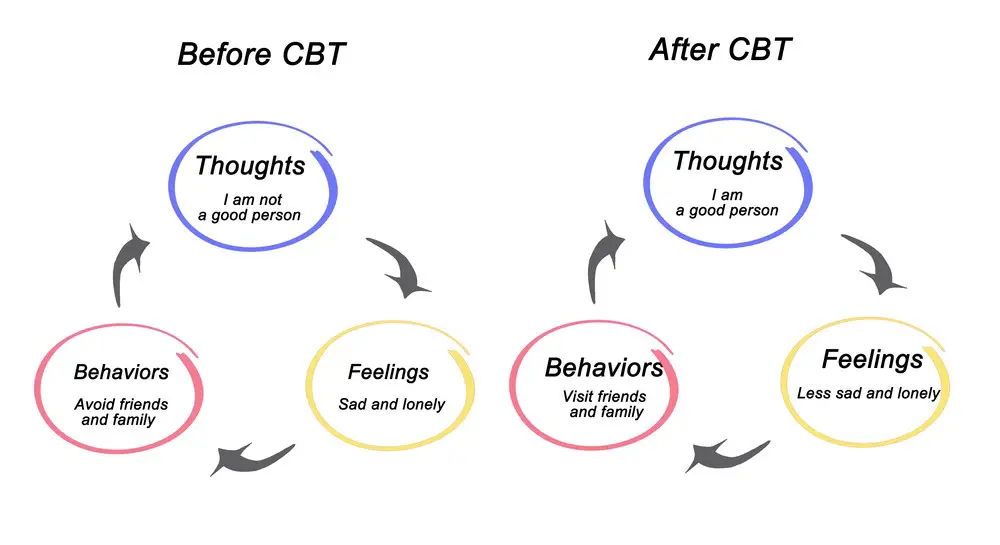As a BetterHelp affiliate, we receive compensation from BetterHelp if you purchase products or services through the links provided
Trauma can have lasting psychological and emotional effects on individuals, often leading to disconnection from oneself, loved ones, and even one’s spiritual beliefs. Christian trauma counseling aims to help individuals navigate the complexities of their traumatic experiences by integrating their faith and spirituality into the healing process. This unique approach to therapy addresses not only the psychological impact of trauma but also the spiritual implications, allowing for a more holistic recovery.
As individuals journey through healing from trauma, they may struggle with questions surrounding their faith, the meaning of suffering, and God’s role in their ordeal. Christian trauma counseling seeks guidance and support during this challenging time by recognizing and embracing faith’s role in cultivating resilience and promoting healing. This therapeutic approach is grounded in a deep understanding of the Christian faith and its doctrines, enabling therapists to guide their clients through the recovery process effectively.
Key Takeaways
- Christian trauma counseling offers a holistic approach to healing by integrating faith and spirituality.
- This form of therapy addresses both psychological and spiritual aspects of trauma recovery.
- Counselors in this field deeply understand the Christian faith and its principles, enabling them to support their clients throughout the healing process better.

Rediscover Hope with Faithful Counseling
Christian Trauma Counseling Overview
Christian Trauma Counseling is a specialized therapy that integrates faith-based principles with trauma-informed counseling techniques. By incorporating elements of Christianity, counselors can provide support and guidance for those struggling with traumatic experiences, aiding them in their journey toward healing and recovery. The approach addresses the psychological aspects of trauma and the spiritual components that may be affected in a person’s life.
One of the primary objectives of Christian Trauma Counseling is to foster a safe and secure environment where individuals can openly discuss their traumatic experiences and emotions. Trauma counselors utilize empathy, active listening, and understanding to help clients process their feelings and work toward resolution and healing.
Incorporating faith-based elements into the counseling process allows clients to explore and reconnect with their spiritual beliefs while navigating the challenges of trauma recovery. This unique integration of therapy and spirituality aims to help clients draw on their faith for strength and guidance. Counselors may utilize scripture readings, prayer, and other spiritual practices to facilitate emotional and spiritual growth.
A key aspect of Christian Trauma Counseling is the concept of trauma-informed care. This approach emphasizes recognizing and understanding the widespread impact of trauma on an individual’s life. It integrates knowledge about trauma into policies, procedures, and practices within the counseling sessions to promote a safe and supportive environment.
As a specialized form of therapy, Christian Trauma Counseling has various techniques and methods that cater specifically to the clients’ needs. These may include Cognitive Behavioral Therapy (CBT), Eye Movement Desensitization and Reprocessing (EMDR), and other evidence-based practices harmonizing with faith-based principles.
Christian Trauma Counseling is a valuable resource for individuals seeking support and guidance in coping with trauma-related issues. Combining the principles of Christianity with evidence-based therapeutic techniques, it offers a holistic and comprehensive approach to trauma recovery.
Causes of Trauma
Trauma often results from experiencing, witnessing, or learning about an event threatening an individual’s physical or emotional safety. One common cause of trauma is witnessing or being involved in a traumatic event. These events can range from natural disasters to acts of violence, leaving lasting psychological and emotional scars.
Past trauma, particularly childhood trauma, often plays a significant role in an individual’s mental health. When a person undergoes traumatic experiences in their early years, they may develop maladaptive coping strategies or thought patterns that persist into adulthood. Childhood trauma stems from various sources, including physical, emotional, or sexual abuse and other complex experiences like enduring neglect, witnessing domestic violence, or living with a family member with a mental illness.
Abuse, in its various forms, constitutes a significant source of trauma for individuals. Physical, emotional, and sexual abuse generates profound feelings of fear, helplessness, and a lack of control. These intense emotions often lead to lasting effects on the individual’s overall well-being.
Events that occur later in life can also prompt traumatic responses. For instance, experiencing a life-threatening illness, a severe accident, being in a war zone, or becoming a victim of a crime can all contribute to traumatic reactions.
In some cases, trauma results from complex experiences—an intricate web of multiple events and circumstances over some time. These situations are often challenging to address due to their multifaceted nature, but grasping their intricacies is vital for effective treatment and healing.
In summary, trauma can arise from many sources. Still, common causes, such as traumatic events, past trauma, abuse, and complex experiences, share an underlying theme of compromised safety and loss of control. Identifying and addressing these causes is essential for successful trauma recovery.

Connect with a Christian Counselor Now
Symptoms and Effects
Christian trauma counseling addresses the wide range of symptoms and effects individuals may experience following a traumatic event. These can include emotional, psychological, and physical manifestations impacting a person’s well-being. It is important to recognize that people respond to trauma differently; therefore, the symptoms and effects can vary.
Anxiety is a common response to trauma, causing persistent and excessive worry, irritability, and feelings of restlessness. Depression may also develop, characterized by sadness, hopelessness, and a lack of interest in once-used activities. Both anxiety and depression can contribute to stress levels in a person’s life, often exacerbating the challenges faced during the healing process.
Another emotional response to trauma is shame, leading individuals to feel unworthy of love, acceptance, or forgiveness. Shame can also be intertwined with guilt, as some blame themselves for the traumatic event or for not preventing it from occurring. These emotions can foster anger toward oneself, others, or God, creating challenges in interpersonal relationships and overall emotional well-being.
Trauma can also lead to post-traumatic stress disorder (PTSD), which presents symptoms such as intrusive memories, flashbacks, nightmares, avoidance of event reminders, and increased arousal and reactivity. PTSD may coexist with other issues like addiction, as individuals may turn to substances or behaviors to cope with their emotional pain.
In some cases, trauma may lead to suicidal ideation or thoughts of self-harm. These thoughts must be taken seriously, and working with a professional counselor to address these concerns is important. On another note, grieving is also a natural response to trauma, particularly when the event involves loss. Grieving can manifest in various ways, including sadness, anger, guilt, or disbelief, and it is essential to provide support as a person navigates this process.
Addressing these symptoms and effects is a crucial aspect of trauma recovery. Christian trauma counseling, specifically, incorporates faith-based principles and beliefs to encourage healing and growth following a traumatic experience, helping those affected to find meaning, hope, and resilience in their journey toward mental, emotional, and spiritual health.

Trustworthy Care for Trauma Recovery
Trauma-Informed Christian Counseling Approach
Trauma-informed Christian counseling combines the principles of trauma-informed care with a biblically-faithful approach to addressing the emotional and psychological needs of individuals who have experienced trauma. This counseling method recognizes the impact of trauma on individuals’ mental, emotional, and spiritual well-being and seeks to provide a safe and supportive environment for healing and growth.
The trauma-informed aspect of this counseling approach emphasizes the importance of understanding and addressing the root causes and effects of trauma. This includes recognizing the signs and symptoms of trauma and creating a safe environment for clients to explore their traumatic experiences without fear of re-traumatization. Trauma-informed care seeks to empower individuals by helping them develop coping strategies and techniques for managing the impact of trauma on their lives.
Incorporating a biblically-faithful perspective, Christian trauma counseling draws from the teachings and values of the Christian faith to provide guidance and hope. This treatment approach integrates scripture and prayer into the therapeutic process to help clients find meaning, purpose, and strength amid their suffering.
One key aspect of trauma-informed Christian counseling is focusing on the client’s relationship with God. Counselors help individuals strengthen their faith and reliance on God as a comfort, healing, and support source. This understanding encourages clients to develop a deeper relationship with God, which can lead to increased emotional and spiritual resilience in the face of adversity.
Another important component of the trauma-informed Christian counseling approach is the emphasis on community and relationships. Counselors encourage clients to foster healthy connections with others, including friends, family, and faith community members. Supportive relationships can provide emotional and practical assistance, allowing individuals to share their experiences, burdens, and healing journeys with others who understand the complexities of trauma and its effects.
In summary, trauma-informed Christian counseling combines elements of trauma-informed care with a biblically-faithful approach to help individuals heal from traumatic experiences. By focusing on clients’ relationships with God, community, and self, this treatment method seeks to provide a holistic, supportive, and empathetic environment for individuals working through the challenging process of healing from trauma.

Experience Compassionate Guidance Today
Types of Christian Trauma Therapies
There are various modalities for Christian trauma counseling, aiming to address and resolve relationship issues, traumatic experiences, and other challenges individuals face. These therapies combine evidence-based psychological treatment approaches with the power of prayer, Christian values, and scripture to provide a holistic healing experience.
Cognitive-Behavioral Therapy (CBT) is a popular model used in Christian trauma counseling. This approach helps individuals identify and change unhealthy thoughts, beliefs, and behaviors. It incorporates biblical principles and encourages clients to use prayer and scripture to refocus their minds on truth and hope, promoting positive change in their lives and healing relational difficulties.
Another widely-used therapy is Eye Movement Desensitization and Reprocessing (EMDR). EMDR aims to help clients process traumatic memories and disturbing experiences. Christian EMDR therapists integrate a client’s faith, utilizing prayer and spiritual resources, to further enhance the healing process and support as they work through traumatic events.
Solution-Focused Brief Therapy (SFBT) is a goal-oriented approach emphasizing positive change and future possibilities. Christian trauma therapists who utilize SFBT often incorporate faith-based components like prayer and scripture to help clients identify their strengths and resources. This can lead to solutions and improved abilities in dealing with relationship issues or other interpersonal challenges.
Christian Trauma-Sensitive Yoga is a body-centered approach that may be used as an adjunct to traditional counseling methods. This modality focuses on mindful movement and breathwork to help clients reconnect with their bodies and foster healing from trauma. Scriptures and Christian themes may be integrated into the practice to support spiritual growth and emotional well-being.
The focus on prayer is integral to all of these therapies, which is considered a powerful tool in Christian counseling. Therapists may encourage clients to pray for guidance and healing throughout their therapeutic journey and offer specific prayers for various issues and concerns, reinforcing spiritual beliefs’ critical role in the healing process.
These various therapeutic modalities equip Christian trauma counselors to meet their client’s unique needs and circumstances while addressing relational and faith-related components crucial to providing a comprehensive healing experience.

Connect with a Christian Counselor Now
The Role of Spirituality in Trauma Recovery
Spirituality plays a significant role in trauma recovery for many individuals. For those that hold Christian faith, this healing process often involves turning to biblical teachings and scripture for guidance through their struggles. Spiritual beliefs may provide comfort, hope, and connection to a higher power during this journey.
In Christian trauma counseling, spiritual practices such as prayer, meditation, and reflection on scriptures can help individuals process their emotions and gain new insights into their experiences. The Bible offers various passages that address suffering, hope, and healing themes, which may resonate with those recovering from traumatic events.
For example, Psalms 147:3 states, “He heals the brokenhearted and binds up their wounds.” This scripture may provide solace to those who are struggling with emotional pain. Furthermore, the Christian faith emphasizes the importance of a supportive community through the church. Group therapy sessions or support groups based on scriptural principles can provide a safe space for individuals to share their experiences and foster spiritual connections with others on a similar journey.
Incorporating spiritual practices into the counseling process may also empower individuals to transform their trauma into an opportunity for personal and spiritual growth. By leaning on their faith, those affected can find strength in believing that God is present and offering support throughout their healing journey.
To sum up, spirituality is critical to trauma recovery for those of the Christian faith. Through scripture, prayer, and spiritual community, individuals can tap into a sense of hope and strength during their healing process.
Choosing a Christian Trauma Counselor
When dealing with trauma, finding the right counselor is essential. Christian trauma counseling integrates faith-based principles with evidence-based therapeutic practices to provide a holistic approach to healing. Here are some factors to consider when choosing a Christian trauma counselor.
Firstly, it is essential to find a counselor who specializes in trauma and is experienced in helping clients overcome their traumatic experiences. They should have the necessary qualifications and expertise to provide comprehensive care. Some mental health professionals may also be licensed, ensuring they adhere to professional guidelines.
Another factor to consider is the counselor’s faith-based approach’s compatibility with your own beliefs. Christian counselors may have different theological perspectives or focus on specific spiritual practices. Ensuring these align with your beliefs will help create a strong therapeutic relationship and promote healing. This can involve asking potential counselors about their faith, attending counseling sessions led by pastors, or seeking recommendations from trusted acquaintances.
Additionally, consider the range of therapeutic strategies practiced by your counselor. Some Christian therapists may use traditional therapeutic techniques, such as cognitive-behavioral and trauma-focused therapy. Others may focus on faith-based practices, such as prayer and spiritual mentorship. Select a counselor that blends the best of both approaches to suit your specific needs and preferences.
Lastly, ensure that your counselor makes you feel comfortable and supported. Trust and rapport are essential ingredients for a successful counseling relationship. Attend initial sessions with potential counselors to gauge the effectiveness of their interpersonal and therapeutic skills.
By considering these factors when choosing a Christian trauma counselor, you can find the right fit to aid you on your journey to healing and rebuilding your life.
Christian Counselor Training and Specialties
Christian counselors are a unique group of professionals who combine psychological principles with biblical wisdom. They receive specialized training and develop key competencies to provide effective, faith-based counseling. This section examines the training and specialties of Christian counselors.
Christian counselors typically hold a master’s degree in counseling, psychology, or a related field from an accredited institution. Many Christian colleges and universities offer comprehensive counseling programs infused with biblical insights, preparing students for a faithful career. In addition, these programs often integrate courses in theology, ethics, and spiritual development to enrich the student’s understanding of the relationship between faith and counseling.
Christian counselors acquire skills in various therapeutic approaches during their training, such as cognitive-behavioral therapy and solution-focused brief therapy. They also learn about family systems, group counseling, and crisis intervention. Furthermore, they are educated in assessment, diagnosis, and treatment planning from a Christian perspective.
Christian counselors can pursue licensure or certification specific to their faith-based approach after completing their education. Several organizations offer certifications, such as the American Association of Christian Counselors (AACC) and the National Christian Counselors Association (NCCA). These certifications usually require continuing education courses and a code of ethics adherence.
Christian counseling has numerous specialties, allowing professionals to focus on the areas that align with their interests and expertise. Some of the most common specialties include:
- Marriage and family counseling: Addressing issues related to relationships, communication, and family dynamics from a Christian viewpoint.
- Addiction and recovery counseling: Helping individuals overcome dependencies and guiding them toward spiritual and emotional healing.
- Trauma and crisis counseling: Providing support and processing distressing events through a faith-based lens.
- Grief and loss counseling: Assisting clients with their emotional and spiritual responses to the pain of loss.
- Career and vocational counseling: Helping individuals discern their calling and navigate work-life challenges from a Christian perspective.
In conclusion, Christian counselors undergo rigorous training incorporating psychological and theological foundations. The wide range of specialties available in the field allows professionals to offer faith-based counsel on various issues, making them an essential resource for those seeking guidance rooted in their beliefs.
Scheduling and Financing Counseling
When seeking Christian trauma counseling, it is important to consider scheduling and financing options. Many counselors offer flexible appointment times to accommodate a variety of schedules. It is recommended to check with the counselor regarding the availability of evening or weekend sessions and their preferred method for scheduling appointments.
Financing counseling can also impact the decision-making process. Clients should inquire about the counselor’s fees and payment structure. Most counselors will provide an initial consultation to discuss their fees and payment expectations. Depending on the counselor, it may be a flat rate or an hourly fee.
Insurance coverage is an essential aspect to consider when financing counseling. Some Christian trauma counselors may accept insurance, while others may not. Clients should check with their insurance provider to verify if counseling services are covered under their specific plan. It may be necessary to obtain a referral from a primary care physician before insurance will cover counseling.
When insurance coverage is unavailable or does not cover the full cost of services, many counselors offer a sliding scale fee structure. This means that the cost of sessions may be adjusted based on a client’s income or financial situation, making counseling more accessible to those with limited resources. Clients should communicate their financial circumstances with the counselor during the initial consultation to explore available financing options and ensure they can afford the treatment.
By considering and discussing scheduling and financing options with a Christian trauma counselor, clients can take a proactive approach in their healing journey while ensuring that they receive the support they need in a manageable and affordable way.
Virtual Christian Trauma Counseling
Virtual Christian trauma counseling combines modern technology with faith-based support to help individuals navigate their emotional and spiritual challenges. This online service is a convenient and accessible option for those needing professional guidance.
Through various online platforms, certified Christian counselors assist clients from the comfort of their homes. This eliminates travel and creates a relaxed environment for clients to open up about their trauma.
Confident and knowledgeable counselors utilize video conferencing tools, instant messaging, and other digital communication methods to provide personalized support to clients. This modern approach to therapy is advantageous for individuals with busy schedules or those in remote locations.
Clients seeking virtual Christian trauma counseling can expect a neutral and empathetic listening experience. Counselors follow biblical principles and proven therapeutic practices to address emotional, mental, and spiritual trauma-related issues.
Additionally, virtual counseling sessions can include:
- Assessing the client’s mental health and well-being
- Identifying the root cause of their trauma
- Providing practical, biblically-informed coping strategies
- Utilizing proven therapeutic interventions, such as Cognitive-Behavioral Therapy (CBT) or solution-focused therapy
- Encouraging spiritual growth and healing through prayer, meditation, or scripture readings
In conclusion, virtual Christian trauma counseling is a valuable resource for individuals seeking professional help that aligns with their faith. This accessible and flexible approach to therapy empowers clients to take control of their healing journey while receiving guidance from compassionate, skilled counselors.
 Seek faith-based healing today.
Seek faith-based healing today.
Tips for Working with a Christian Trauma Counselor
The counseling process can be intimidating, and it is important to find the right fit between the client and the counselor. It is also essential that trauma survivors feel comfortable discussing their experiences to benefit from therapy. Here are some tips for working with a Christian trauma counselor:
1. Do your research: Before beginning treatment, take time to research potential counselors and assess if they have the experience and qualifications needed for successful recovery. Clients should also ensure practitioners adhere to their professional organizations’ or governing bodies’ ethical standards.
2. Be honest: Trauma counseling relies heavily on open communication and transparency between clients and counselors. We encourage you to share what brought you into therapy so that your counselor can provide tailored guidance and support.
3. Ask questions: Don’t hesitate to ask questions or voice any concerns about the counseling process, such as fees, scheduling preferences, or payment options. It is important to establish a clear understanding of expectations before therapy begins.
4. Prepare for appointments: Clients should come prepared for each session by bringing relevant documents, notes for discussion topics, and any other materials they deem useful in their healing journey.
5. Seek outside support: Trauma recovery often involves more than just counseling sessions, so it is important to explore additional resources that could aid in your progress. Speak with family members or close friends for emotional support or contact organizations specializing in trauma-related services.
Find Comfort and Healing in Faith
Resources for Trauma Recovery
Trauma recovery is a multi-faceted process that often requires a combination of resources to address various needs. Survivors need access to mental health support, psychological care, and medical services as they heal from traumatic events. Effective trauma counseling often integrates different therapeutic methods, empowering individuals to overcome distress and achieve emotional stability.
Author Greg Wilson has written extensively on trauma recovery and provides valuable guidance to those working through difficult experiences. His works can help clarify the complex nature of trauma and address common concerns and misconceptions that survivors may face.
A valuable aspect of trauma counseling involves using worksheets designed to help guide survivors through specific areas of concern. Worksheets can provide a structured format for self-reflection and growth, allowing individuals to identify patterns, establish coping strategies, and better understand their emotional needs.
Visual aids, such as photos, can also serve as therapeutic tools in the recovery process. Images or illustrations may help survivors visualize particular aspects of their trauma by allowing them to process events or emotions in a way that resonates with them. Exploring personal connections to images can help individuals process their experiences and tap into deeper levels of healing.
As trauma recovery is an ongoing journey, staying up-to-date with current news and research is crucial for therapists and survivors. Understanding the latest developments in the field can ensure that treatments remain evidence-based and effective. This can be achieved by engaging in professional development opportunities, subscribing to relevant newsletters, or following trustworthy sources online.
In summary, a comprehensive approach to trauma recovery requires a combination of resources. By being informed and prepared, survivors can confidently navigate the complex process and build a strong foundation for their emotional well-being.
Faithful Counseling is an online Christian counseling service specializing in trauma counseling, using faith-based approaches to provide guidance and healing.
Frequently Asked Questions
What is the role of faith in trauma therapy?
Faith is crucial in Christian trauma therapy, providing a foundation of hope, strength, and resilience. In the healing process, faith is utilized to help individuals cope with traumatic experiences, offering a sense of meaning and purpose. Christian therapists work with clients through prayer, scripture, and spiritual support to facilitate emotional and spiritual healing.
How does Christian trauma counseling differ from regular trauma counseling?
While both approaches focus on addressing trauma, Christian trauma counseling integrates beliefs, values, and practices from Christianity into therapeutic interventions. This approach allows clients to explore connections between their faith and experiences, examining trauma through a spiritual lens. In contrast, regular trauma counseling typically employs secular models, such as cognitive-behavioral therapy (CBT) or eye movement desensitization and reprocessing (EMDR).
Can Christian counseling help with PTSD?
Yes, Christian counseling can effectively treat individuals suffering from PTSD. By integrating faith and well-established therapeutic approaches, such as trauma-focused cognitive-behavioral therapy (TF-CBT), Christian therapists help clients address traumatic memories, process related emotions, and develop coping strategies rooted in their faith.
What are the techniques used in Christian trauma-informed care?
In Christian trauma-informed care, therapists use various techniques that harness the power of faith while addressing the impact of trauma. Some examples include prayer, guided biblical meditations, forgiveness exercises, and exploring the client’s spirituality. Additionally, these therapists may incorporate traditional evidence-based practices such as CBT, EMDR, and narrative therapy within the context of the client’s faith.
How do I find a qualified Christian therapist near me?
To find a qualified Christian therapist near you, search online directories specifically geared toward Christian counseling, such as the American Association of Christian Counselors (AACC). Contact your local church for recommendations or referrals to professional therapists within your faith community. Alternatively, look into online counseling options provided by organizations such as Faithful Counseling which provide personalized faith-based therapy from licensed professionals across the US. Online counseling can be a convenient, accessible, and affordable way to receive quality care from the comfort of your own home.
Are there any specific resources for Christian trauma recovery?
Yes, there are various resources available for individuals seeking Christian trauma recovery. Some options include the American Association of Christian Counselors (AACC), faith and trauma recovery books, online support groups, and local workshops. Your therapist or church community can provide valuable guidance and tailor recommendations based on your needs and experiences.
- Breaking the Silence: Why Men’s Mental Health Matters More Than Ever - April 15, 2025
- How to Transform a Home’s Patio Space into a Relaxing Space - March 23, 2025
- 5 Strategies to Use a Cell Phone to Help Manage Your Stress - March 23, 2025
This site contains affiliate links to products. We will receive a commission for purchases made through these links.




